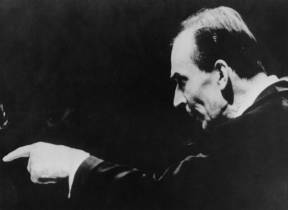
Igor Markevitch (August 9, 1912 – March 7, 1983) Igor Markevitch was a Ukrainian, Italian, and French composer and conductor. Born in Kiev, son of the pianist Boris Markevitch and Zoya Pokitonov, Markevitch moved with his family to Paris in 1914 and Switzerland in 1916. Alfred Cortot discovered his musical ability and took him to Paris in 1926 for training as a composer and pianist at the Ecole Normale , where he studied under Cortot and Nadia Boulanger. He gained recognition in 1929 when he was discovered by Serge Diaghilev, who commissioned a Piano Concerto from Markevitch and desired him to collaborate on a ballet with Boris Kochno. In a letter to the London Times Diaghilev hailed Markevitch as the man who would put an end to 'a scandalous period of music ... of cynical-sentimental simplicity'. The ballet project came to an end with Diaghilev's death on 19 August 1929, but Markevitch's works were accepted by the publisher Schott and he continued to produce at least one major work per year during the 1930s, being rated among the leading contemporary composers. He started being hailed as "the second Igor" — the first Igor being Igor Stravinsky. Markevitch collaborated on a ballet, Rébus with Leonid Massine (1931) and another, L'envol d'Icare (1932) with Serge Lifar; neither was staged, though both scores were performed as concert works. L'envol d'Icare, based on the legend of the fall of Icarus, which Markevitch himself recorded in 1938 with the Belgian National Orchestra, was especially radical, introducing quarter-tones in both woodwind and strings. (In 1943 he recomposed the work under the title Icare, eliminating these, rescoring and simplifying the rhythms.) Béla Bartók once described Markevitch as "...the most striking personality in contemporary music..." and cited him as an influence on his own composing. An independent version of L'envol d'Icare for two pianos and percussion, which Bartók heard, is believed to have influenced Bartók's own Sonata for 2 Pianos and Percussion. Markevitch continued composing as war approached but not long after completing his last original work, the Variations, Fugue and Envoi on a Theme of Handel for piano, in October 1941 he fell seriously ill. After recovering, he decided to give up composition and focus exclusively on conducting. His last compositional activities were the revision of L'envol d'Icare and arrangements of other composer's music, of which the version of The Musical Offering by J. S. Bach is especially notable. Markevitch made his debut as a conductor at age 18 with the Royal Concertgebouw Orchestra. As a conductor, he was well-respected for his interpretations of the French and Russian repertory and of twentieth-century music. He settled in Italy and became an Italian citizen. During the Second World War he was active with the partisan movement. He relocated again, to London in 1953, and then to Switzerland. Beginning in 1965 he worked for the Spanish RTVE Orchestra. In 1970, after ignoring his own compositions for nearly 30 years, he conducted a concert of his own music in Brussels and thereafter a slow revival of his original works began. He died suddenly from a heart attack in Antibes on March 7, 1983.
Johannes Brahms Symphony no 4 in E minor, Op. 98 12.10.1959 Gustav Mahler Symphony no 1 in D major "Titan" Peter Ilyich Tchaikovsky Symphony no 4 in F minor, Op. 36 10.03.1967 Orchestra Sinfonica di Torino Della RAI Igor Markevitch | 
